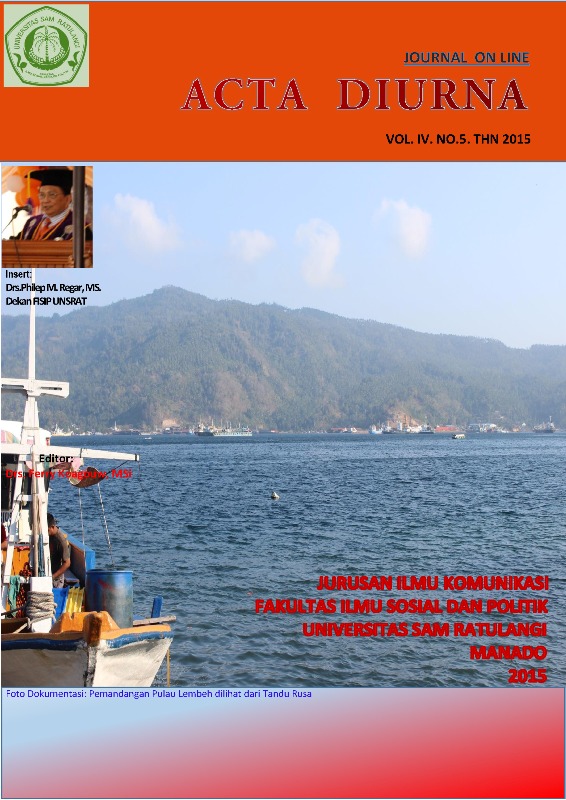KONSTRUKSI DIRI ANAK PASCA PERCERAIAN ORANGTUA DI LINGKUNGAN MASYARAKAT KELURAHAN KAROMBASAN UTARA KECAMATAN WANEA KOTA MANADO
Abstract
The family is a group of people who live together in a residence together, and each of the members feel the inner engagement resulting in mutual influence and attention. Basically the family is a community under one roof, happiness in the family can be felt when a husband, wife and children live and live together sharing love and sorrow.
This study aims to examine in depth the construction of the child after the divorce of parents in communicating within the North Village community Karombasan Manado. By involving 10 informants children of divorce as a source of primary research data and information.
The method used is qualitative method. Data collection techniques such as interviews, participant observation using the Theory of Social Construction of Self (Rom Harre) and Theory of Self-concept (George Heaberd Mead). Identification of the problem is (1) how negative self-concept children post-divorce parents in communicating in the Village community Karombasan Wanea District of Manado City.
Results showed results stated that the negative self-concept children after the divorce of parents is the behavior of a closed, sensitive, emotional, lack of confidence and the rebels. While the case is less effective communication. While positive self-concept post-divorce child is old oran independent behavior, hardworking and appreciate. Effective communication takes place both internally and externally.
Keywords: Construction, themselves, children, post-divorce, the parents.
Â
Abstrak
Keluarga adalah sekumpulan orang yang hidup bersama dalam tempat tinggal bersama, dan masing-masing anggota merasakan pertautan batin sehingga terjadi saling mempengaruhi dan memperhatikan. Pada dasarnya keluarga adalah sebuah komunitas dalam satu atap, kebahagiaan dalam keluarga dapat dirasakan apabila suami, istri dan anak tinggal dan hidup bersama saling berbagi suka maupun duka.
Penelitian ini bertujuan untuk mengkaji secara mendalam konstruksi diri anak pasca perceraian orang tua dalam berkomunikasi dilingkungan masyarakat Kelurahan Karombasan Utara Kota Manado. Dengan melibatkan 10 informan anak korban perceraian sebagai sumber data dan informasi utama penelitian.
Metode yang digunakan adalah metode kualitatif. Teknik pengumpulan data berupa wawancara mendalam, pengamatan berperan serta dengan menggunakan teori Teori Konstruksi Sosial Diri (Rom Harre) dan Teori Konsep diri (George Heaberd Mead). Identifikasi masalah adalah (1) Bagaimana konsep diri negative anak pasca perceraian orang tua dalam berkomunikasi di lingkungan masyarakat Kelurahan Karombasan Kecamatan Wanea Kota Manado.
Hasil penelitian menunjukkan Hasil penelitian menyatakan bahwa konsep diri negatif anak pasca perceraian orang tua adalah prilaku tertutup, sensitif, emosional, kurang percaya diri dan pemberontak. Sedangkan komunikasi terjadi adalah kurang efektif. Sedangkan konsep diri positif anak pasca perceraian oran tua adalah perilaku mandiri, pekerja keras dan lebih menghargai. Komunikasi berlangsung efektif baik secara internal dan eksternal .
Kata kunci : Konstruksi ,diri, anak, pasca perceraian, orang tua

